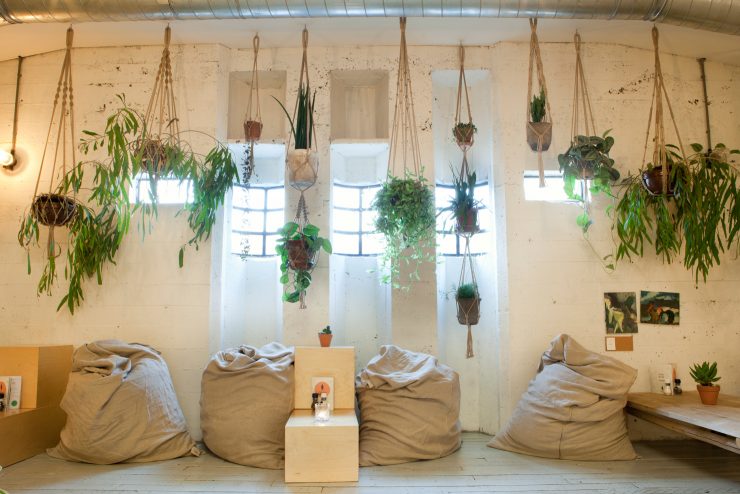
What if there was a cafe where you could just as readily perch on a barstool to down a naked double-shot espresso adeptly pulled on a Kees van der Westen Spirit as recline alongside a low-lying table to eat breakfast-all-day and sip the gentle yield of an AeroPress, a Chemex, or a V60? A cafe where you could just as easily order a craft California Common brewed over 5,000 miles away from its Golden State origins as nurse a fresh ginger-orange tea while fixated on your laptop, which need not be laid on your lap, but rather a clean, well-illuminated hardtop? A cafe where you could lunch on a chicory and blue cheese salad or a pastrami-on-sourdough? A cafe where you could dine on slow-roasted lamb or a beef or tempeh burger? A cafe, perhaps, where you could dessert on spiced chocolate quesadillas or passion fruit meringue pie? A cafe where, anytime between 8 a.m. and 11 p.m., you could imbibe the juice of a fresh young coconut, holding the whole fruit in your own two hands and, if you liked, spiked with a shot of rum? A cafe where you could, for goodness’ sake, make a reservation, or get it all to go?
Hey there, stargazer, come back to earth. A place in Amsterdam awaits you.
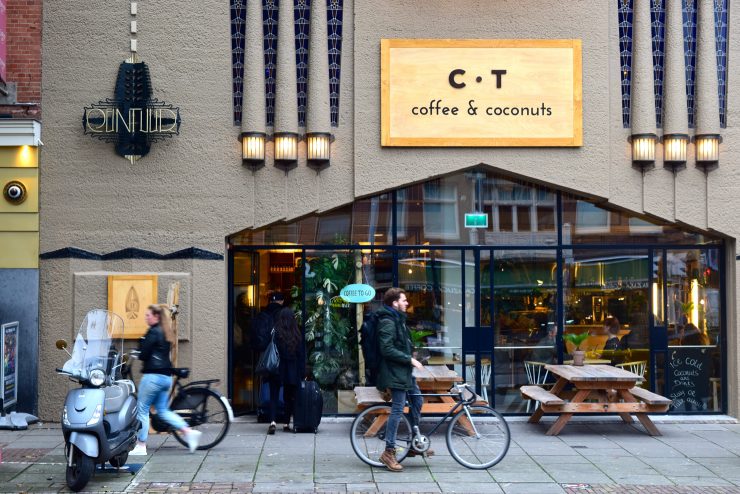
Enter the prismatic paradise that is CT Coffee & Coconuts. White-washed walls serenely interplay with the industry of red brick and exposed piping. Everywhere you look there are genial configurations of light wood furniture, soft linen cushions, and healthy plants. The soaring ceiling, toward which three sets of staircases ascend, imbues a visitor with aspiration and hope. In fact, if heaven were a flat-white-serving cabana, this is how it would look.
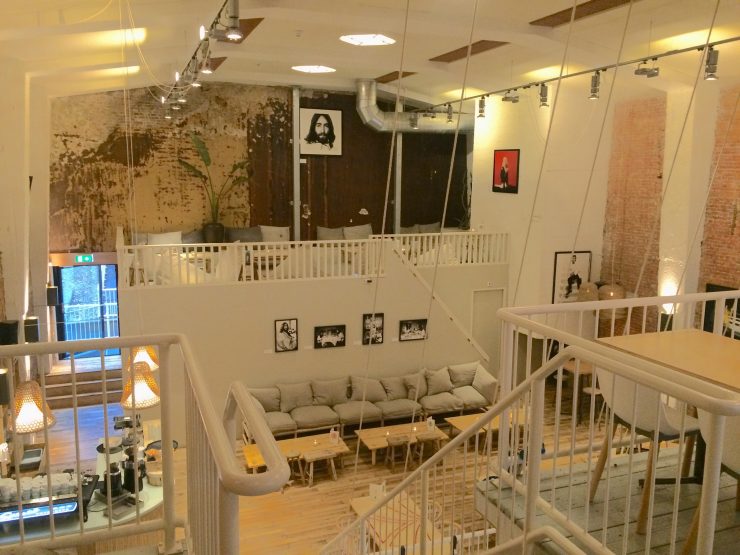
That Coffee & Coconuts opened a year ago in the neighborhood of De Pijp was, like countless other Amsterdam occurrences, a two-wheel-enabled serendipity. As Chef Ruerd Akersloot and his business partner, Jasper van het Nederend, were readying to sell their restaurant in Zandvoort and establish something new, a colleague happened to bike past an unmistakably art deco facade. All sandcastle-like stacked geometry and frosted-glass lamps, the building, from the 1920s, was once a theater. During that fateful bike ride, the colleague noticed it was for rent. The cyclist was Bas Beijer, founder and once-owner of the cafe within Hutspot, a two-minute pedal away.
Before long, the three men became the old theater’s tenants, united as partners to pursue what Akersloot says was supposed to be “just a coffee shop, just specialty coffee—that’s it.” What ensued were months of renovation, talks with the city about precisely which structural changes were permitted to an officially registered historical building, and a series of “Oh, why not?” in reply to their own increasingly elaborate visions of the future Valhalla.
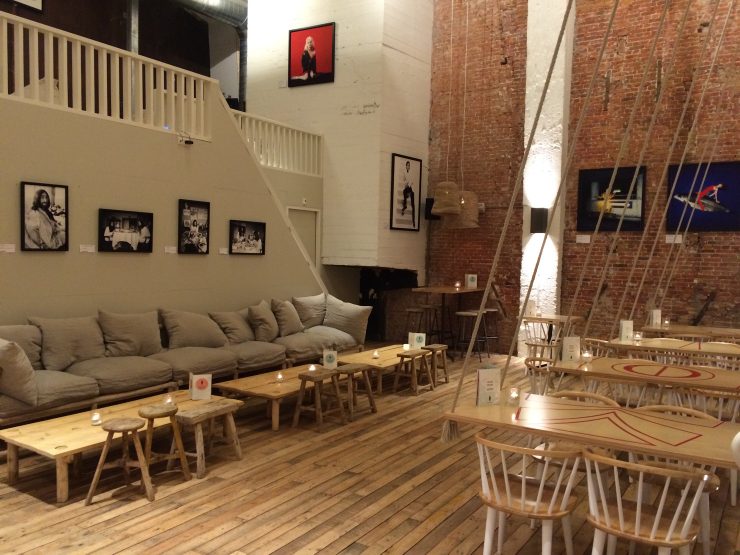
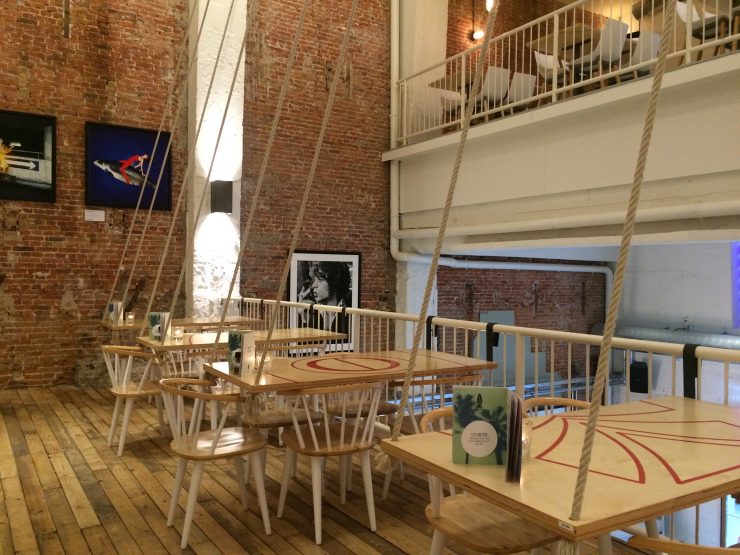
Today, the seating capacity is 310. An anomaly for this part of town, all that space spreads over multiple levels, each of which, Akersloot has observed, has an ecology. Cued perhaps by the portrait of John Lennon hanging above it, the loft tends to be a relaxed “mix” of people and purposes. The balcony is conducive to work, though it’s not uncommon that day laborers migrate to the mezzanine for a glass of wine and re-station there, on a sofa or at one of the rope-suspended tables, co-created with Sukha designers. The mezzanine also has an espresso bar, smaller than the one on the ground floor in terms of countertop, but identical, equipment-wise: a three-group Kees van der Westen Spirit and a duo of Mazzer grinders. The entry level attracts the quicker crowd, inclined to “have a coffee, maybe a sandwich, sit at the bar.”
Akersloot admits, however, that accommodating a diverse clientele is not always easy.
“We get everything from grandmas to tourists [plus] a lot of local people, and they all mix. But it’s also hard to really focus on your specialty coffee,” he says. “You get people at the bar who are coffee freaks, but we also get people in that have no idea—they just want to drink a coffee.”
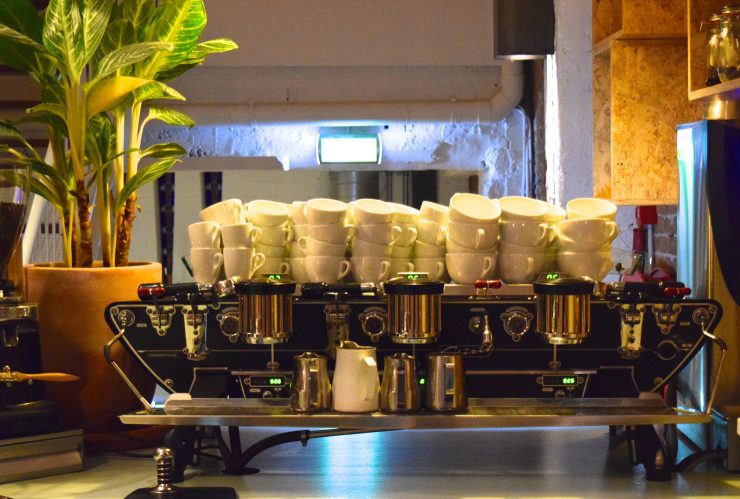
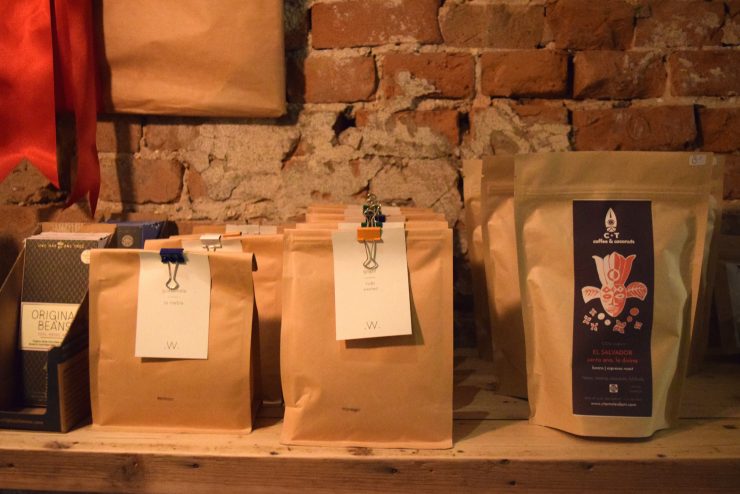
If busyness is any indication, the cafe well balances the range of patrons, serving a house espresso uniquely roasted for them by Bocca and a rotation of specialty micro-roasts by White Label Coffee. Altogether, Coffee & Coconuts estimates selling 60 kilos’ worth of espresso drinks a week. That translates to comparable weekly sales in coconuts, reportedly spanning from 400 to 600.
In a teal and coral palette, the menu’s illustrations hearken some Pacific surf sensibility and Harry Nilsson lyrics are penned here and there. It appears almost too whimsical. But to order off it—seven days a week, 16 hours a day (or 15 on a weekend)—yields wholesome, formidable cafe fare, much of it organic and locally sourced.
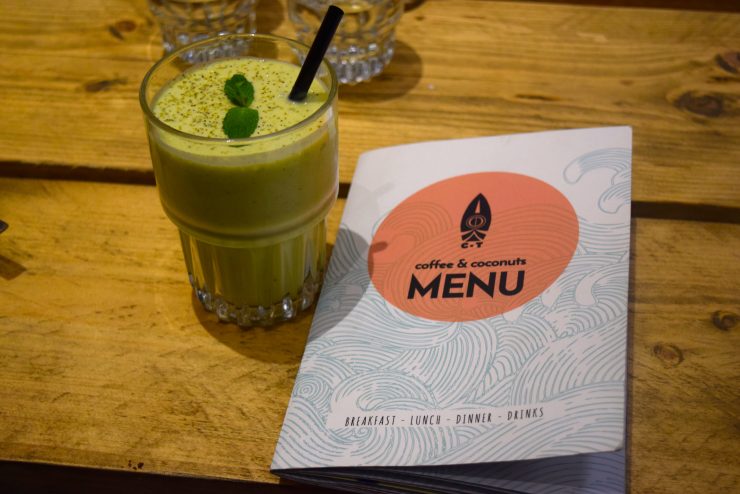
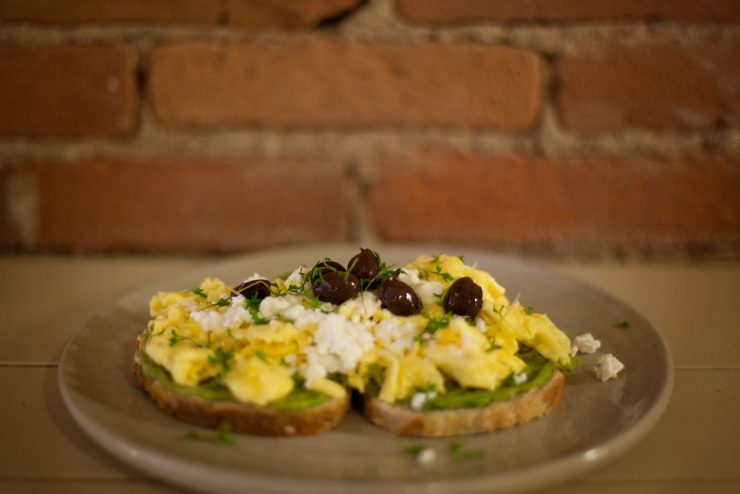
And speaking of local, the neighborhood seems pleased with Coffee & Coconuts, despite the proliferation of nearby coffee outlets, both independent and chain. A particularly warm reception has come from an unexpected demographic: “the older people—by ‘older,’ I mean 80—that grew up here and still know this place as a theater and have said, ‘Oh, I had my first kiss right there,’” explains Akersloot.
“They come in and they drink a glass of water—it’s not the generation that spends money on horeca—but it’s fine,” he continues. “You’ll see an old-timer and they’re staring, and [you know] this is probably someone from around, or they moved far away and their sons and daughters take them here. It’s special.”
Coffee & Coconuts—its celestial surroundings, the generous array of spots to get comfortable, a menu with broad, cheerful appeal—may sound like a fantasy. But it’s not. It’s a reality waiting to make all your cafe (and coconut) dreams come true.
CT Coffee & Coconuts is located at Ceintuurbaan 282-284, Amsterdam. Visit their official website and follow them on Facebook and Instagram.
Karina Hof is a Sprudge staff writer based in Amsterdam. Read more Karina Hof on Sprudge.
The post Coffee & Coconuts: Amsterdam’s Theater Of Cafe Design appeared first on Sprudge.

